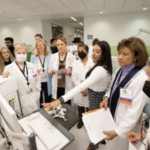1. Introduction to Endodontics
Discover the field of endodontics, which focuses on the study and treatment of dental pulp and tissues within the tooth.
2. Importance of Dissertation Topics
Understand the significance of choosing relevant and impactful dissertation topics for academic research in endodontics.
3. Accessing Library Resources
Explore the vast array of resources available in libraries, including books, journals, and online databases, for finding dissertation topics in endodontics.
4. Literature Review
Conduct a thorough literature review to identify current trends, gaps in knowledge, and areas of interest in endodontic research.
5. Emerging Trends
Explore emerging trends and advancements in endodontics that can serve as potential dissertation topics.
6. Clinical Research Topics
Consider clinical research topics such as treatment outcomes, new materials and techniques, and management of complex cases in endodontics.
7. Basic Science Research
Explore basic science research topics including pulp biology, microbiology, and biomaterials in endodontics.
8. Regenerative Endodontics
Investigate topics related to regenerative endodontics, such as stem cell therapy and tissue engineering for pulp regeneration.
9. Microsurgery
Explore topics related to endodontic microsurgery, including periapical surgery and management of root canal anatomy.
10. Diagnosis and Imaging
Consider topics related to diagnostic methods and imaging modalities in endodontics, such as cone-beam computed tomography (CBCT) and digital radiography.
11. Pain Management
Explore topics related to pain management in endodontics, including local anesthesia techniques and post-operative pain control.
12. Endodontic Complications
Investigate topics related to complications in endodontic treatment, such as root perforations, instrument fractures, and procedural errors.
13. Pediatric Endodontics
Consider topics related to pediatric endodontics, including pulpotomy techniques, apexogenesis, and management of immature teeth.
14. Endodontic Pharmacology
Explore topics related to pharmacology in endodontics, including antimicrobial agents, analgesics, and intracanal medicaments.
15. Endodontic Education and Training
Investigate topics related to endodontic education and training, including curriculum development, assessment methods, and continuing education programs.
16. Multidisciplinary Approaches
Consider topics related to multidisciplinary approaches in endodontics, such as endodontic-periodontal relationships and endodontic-restorative integration.
17. Systematic Reviews and Meta-analyses
Explore topics related to systematic reviews and meta-analyses in endodontics, synthesizing evidence on specific treatment modalities or techniques.
18. Practice-based Research
Consider topics related to practice-based research in endodontics, such as outcomes assessment in clinical practice and implementation of evidence-based guidelines.
19. Ethical Considerations
Explore topics related to ethical considerations in endodontic research, including patient consent, confidentiality, and conflicts of interest.
20. Global Perspectives
Investigate topics related to global perspectives in endodontics, such as access to care, disparities in treatment outcomes, and cultural considerations.
21. Future Directions
Consider potential future directions for research in endodontics, including advancements in technology, personalized medicine, and interdisciplinary collaboration.
22. Collaboration Opportunities
Explore opportunities for collaboration with other disciplines such as microbiology, bioengineering, and pharmacology in endodontic research.
23. Mentorship and Guidance
Seek mentorship and guidance from experienced faculty members and researchers in endodontics when selecting dissertation topics.
24. Tailoring Topics to Interests and Goals
Tailor dissertation topics to align with personal interests, career goals, and areas of expertise within endodontics.
25. Conclusion: Navigating Dissertation Topics in Endodontics
Selecting dissertation topics in endodontics requires thorough exploration of literature, consideration of emerging trends, and alignment with personal interests and goals, ultimately contributing to advancements in the field.



